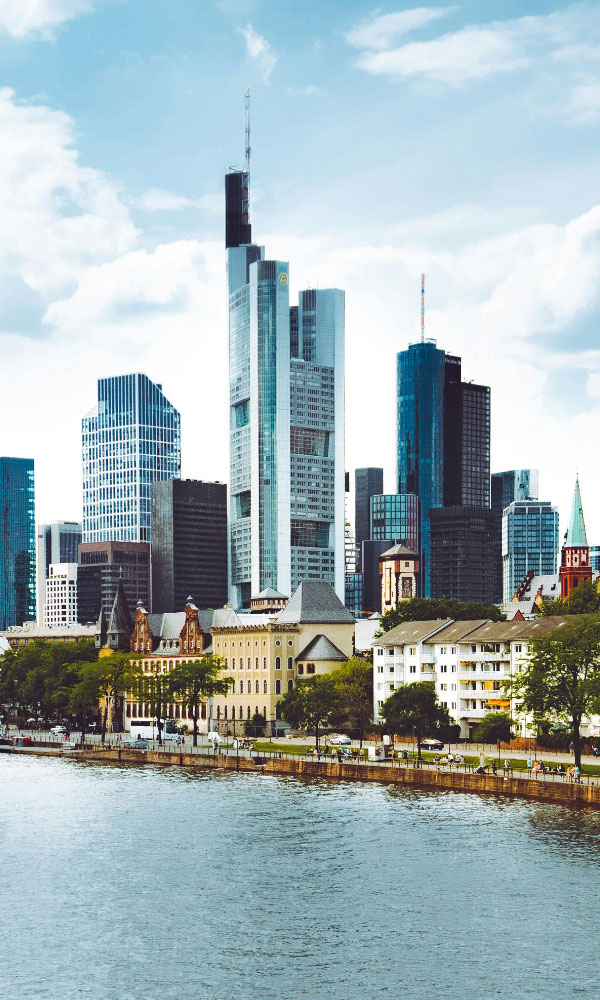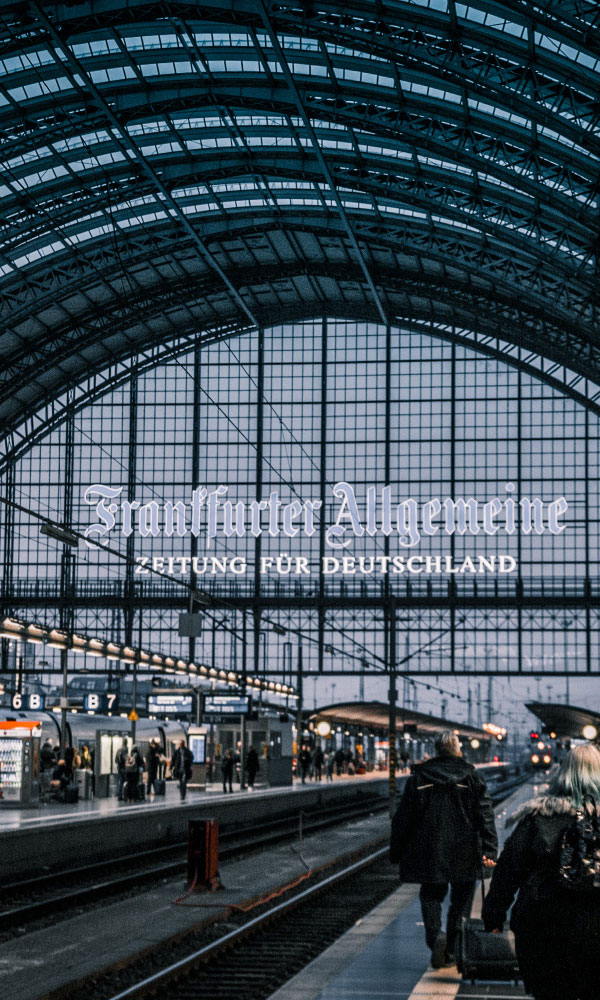Travelling to Frankfurt?
Are you heading to Frankfurt on a work trip? Get to know the city better in our comprehensive guide for business travellers.
Nestled in the beating heart of southwest Germany, Frankfurt is renowned for being the nation’s financial epicentre, its soaring skyline of glass and steel a rousing display of the city’s significance on the global stage.
Yet dig beneath the urban surface – particularly in the central area of Innenstadt – and you’ll find nuanced layers where German tradition and modern life converge, bringing charm and colour to a city which might have been lost to the sharp lines and monotone efficiency of globalisation.
In this guide, we look deeper into Frankfurt as a business travel destination. We look into the best ways to get to and from the city, explore the local business culture, and offer our top 3 things to see or do.
Frankfurt Fact File
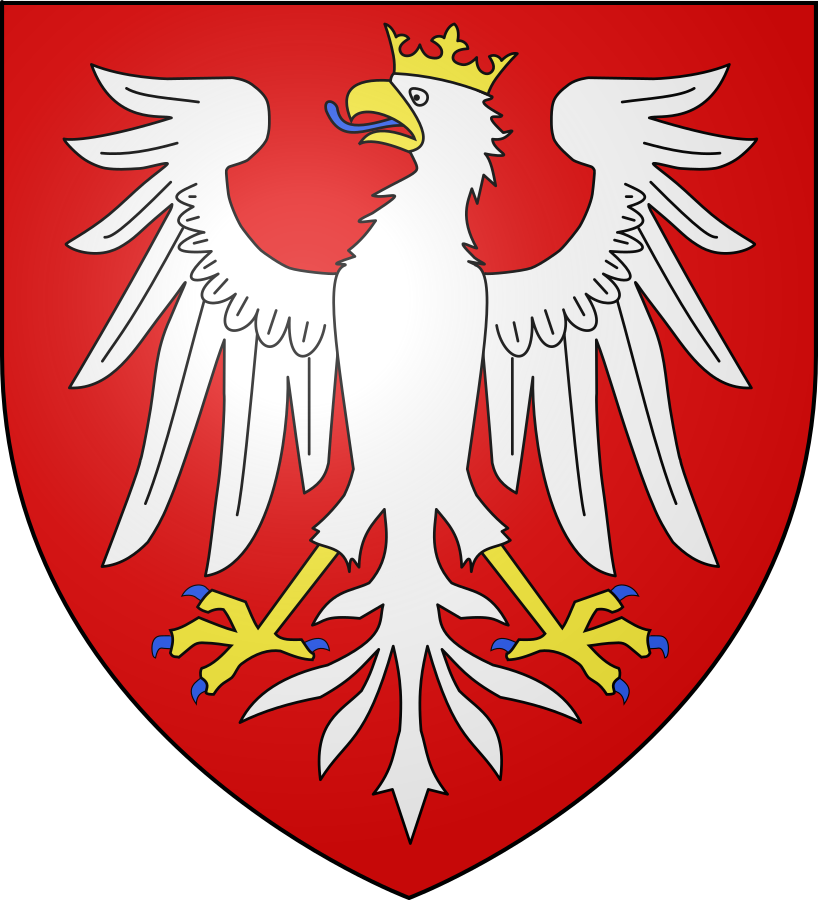
The Frankfurt coat of arms depicting the Imperial eagle to celebrate the city being granted the rank of Imperial City in 1245
Languages
German and widespread fluency in English
Currency
Euro (€)
Avg. Temperatures
Spring (Mar-May) = 14 °C (57.2 °F)
Summer (Jun-Aug) = 22.7 °C (72.9 °F)
Autumn (Sep-Nov) = 10 °C. (50.0 °F)
Winter (Dec-Feb) = 3 °C (37.4 °F)
Getting To Frankfurt
By Air
Flughafen Frankfurt am Main (FRA) is Frankfurt’s main airport and one of the busiest in Europe. It is strategically located about 12 kilometres southwest of the city centre and serves as a hub for numerous airlines. The airport also has its own train station with regular trains connecting the airport to the city centre.
By Rail
Frankfurt Hauptbahnhof is a major train station offering excellent connectivity from various European cities. High-speed trains, such as the ICE (InterCityExpress), are especially efficient for those from international destinations like Paris or Amsterdam. You can find out more about European rail here.
By Car
Frankfurt is well-connected to Germany’s extensive Autobahn network, making it easily accessible by road. If driving from the north or east you can follow the A3 Autobahn, the A5 Autobahn northeast if driving from the south, or the A66 Autobahn eastbound if travelling from the west e.g. from Mainz.
Business Culture & Etiquette
As a financial hub and vibrant centre of commerce, Frankfurt has a distinct business culture. The general business environment is formal – a polished and professional appearance is generally expected, with suit and tie dress codes a visible norm.
Handshakes are a common form of greeting in business settings. Most professionals address each other using titles and last names, and will only use first names once a more informal relationship is established.
Decision-making in Frankfurt tends to be thorough and cautious. Expect detailed discussions and a preference for facts and figures. Decisions are often made collaboratively, and consensus is sought before moving forward.
A few of our other top business tips:
- Exchanging business cards is a common practice in Frankfurt. Ensure that your business card includes your academic qualifications, as education is highly regarded in German business culture.
- While professionalism is highly valued, there is also an emphasis on maintaining a healthy work-life balance. Germans prioritise efficiency during working hours but appreciate downtime outside of the office
Crime & Safety
Though Frankfurt is generally considered a safe city for business travellers, anecdotal sources often consider it one of the most dangerous cities in Germany, earning it a reputation as the “Crime Capital of Germany”. However, while the overall crime rate in Frankfurt is indeed higher than average in the country, it is still relatively low when compared to other international cities, including London.
Violent crime is very rare, but be wary of pickpockets in popular tourist destinations, especially in the Romer area. The area around the main train station, known as Bahnhofsviertel, includes a red-light district. While considerable positive changes have been made in Bahnhofsviertel, it’s still recommended to exercise caution, particularly at night.
Here are a few of our other top safety tips:
- Though many Frankfurters speak English, learning a few basic German phrases can prove helpful. Useful words include “bitte” (please), “danke” (thank you), and “verabschiedung” (goodbye).
- The emergency phone number in Germany is 112 for police, medical assistance, or fire emergencies.
- Consider wearing a money belt under your clothes to deter pickpockets in busy central areas.
Getting Around Frankfurt
Train (S-Bahn)
Frankfurt’s extensive Rhine-Main S-Bahn (suburban trains) connects Frankfurt with the surrounding regions, including cities such as Wiesbaden and Mainz. The Frankfurt Hauptbahnhof serves as the main terminal for all routes and tickets can be bought online via the RMV-Ticketshop.

Bicycles (Fahrrad)
Frankfurt is a bicycle-friendly city with dedicated bike lanes and bike-sharing services, including nextbike by TIER. The Frankfurt tourism industry also provides comprehensive guides and recommended routes should you wish to explore more of the city and surrounding areas by bicycle.

Underground (U-Bahn)
First opened in 1968, Frankfurt’s U-Bahn is one of the most efficient ways to get around the city. Formed of several lines, designated U1 to U9, the U-Bahn has a central hub in Frankfurt Hauptwache, a major interchange in the city. Daily, weekly, and monthly tickets are available.
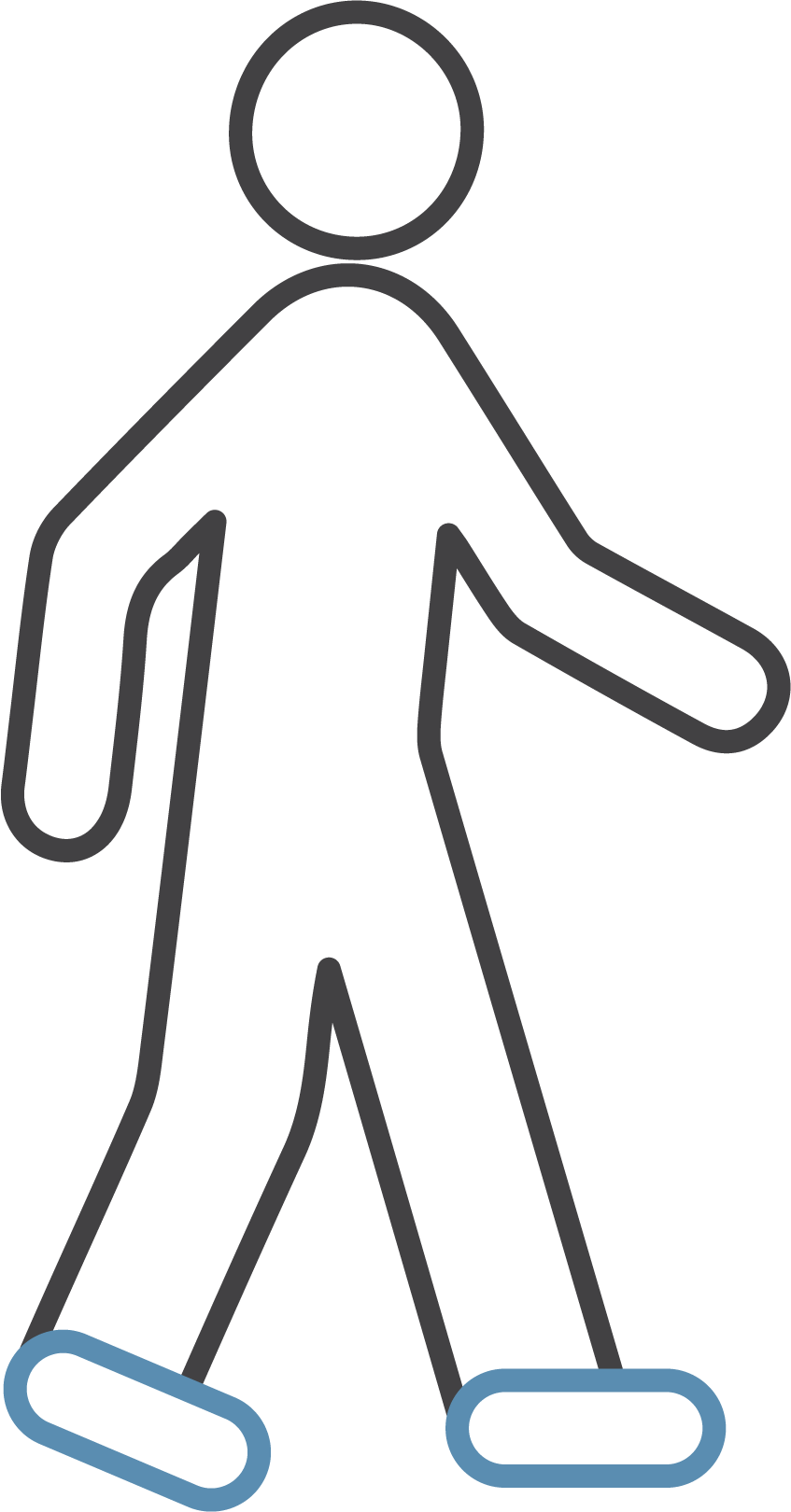
On Foot (zu Fuß)
Frankfurt’s city centre is relatively compact, making it easy and convenient to explore on foot. Many of the city’s major attractions, shopping districts, and restaurants are within walking distance of each other, particularly in the main business hubs of Altstadt and Innenstadt.
Top 3 Things To See Or Do In Frankfurt
If you find yourself with a bit of free time on your business trip, Frankfurt is an interesting and vibrant city with plenty to explore. Here are our top 3 recommendations…
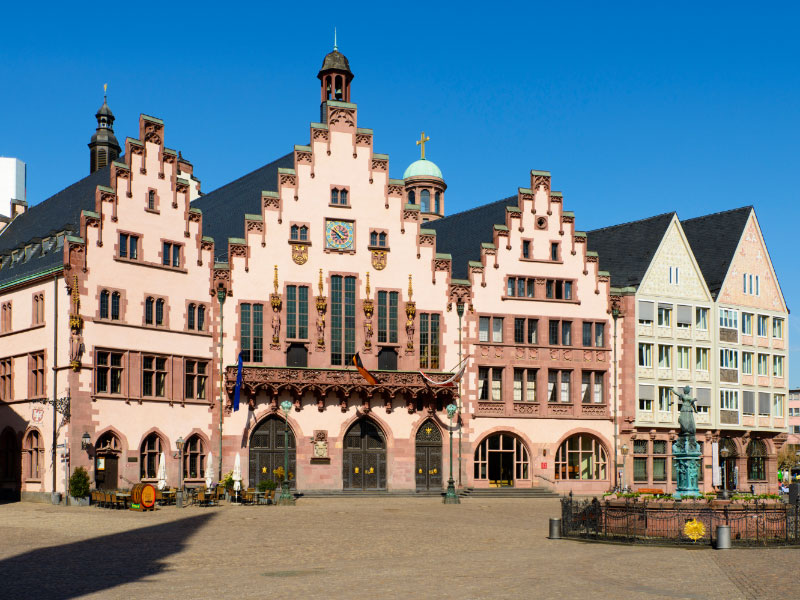
1. The Römer
The Römer is Frankfurt’s historic town hall and an enduring city symbol. Located in Frankfurt’s Old Town (Altstadt), the building’s distinctive stepped facade and medieval architecture starkly contrast with the steel and glass of the financial districts. Visitors can explore its various rooms, including the Kaisersaal (Emperor’s Hall) and the Schwanenhalle (Swan Hall), while the surrounding Römerberg square is lined with charming half-timbered houses – the perfect setting for a leisurely walk.
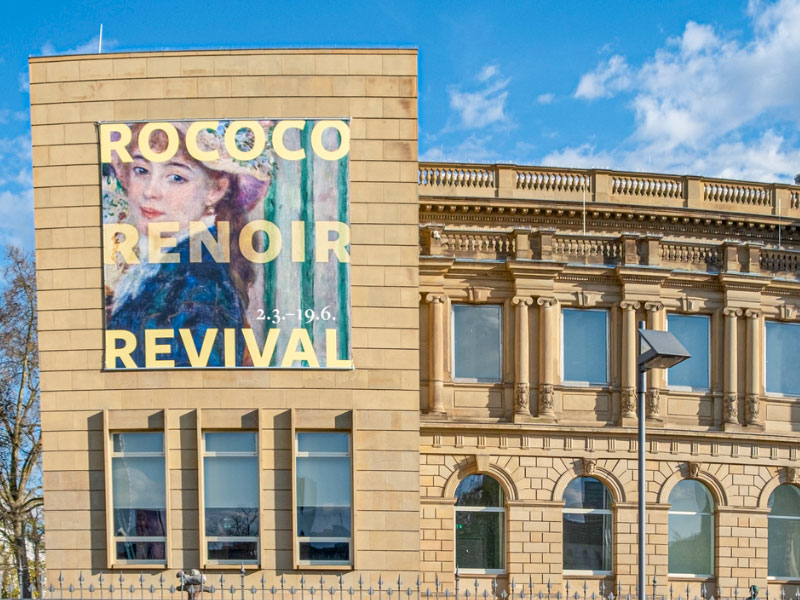
2. Städel Museum
Städel is one of Germany’s most important art museums. Located on the Museumsufer (Museum Embankment), the museum houses an extensive collection of European art from the Middle Ages to contemporary works, including masterpieces by artists such as Rembrandt, Vermeer, and Botticelli, Such an impressive selection of paintings, sculptures, and decorative arts, makes the Städel Museum a must-visit cultural hub for art lovers.
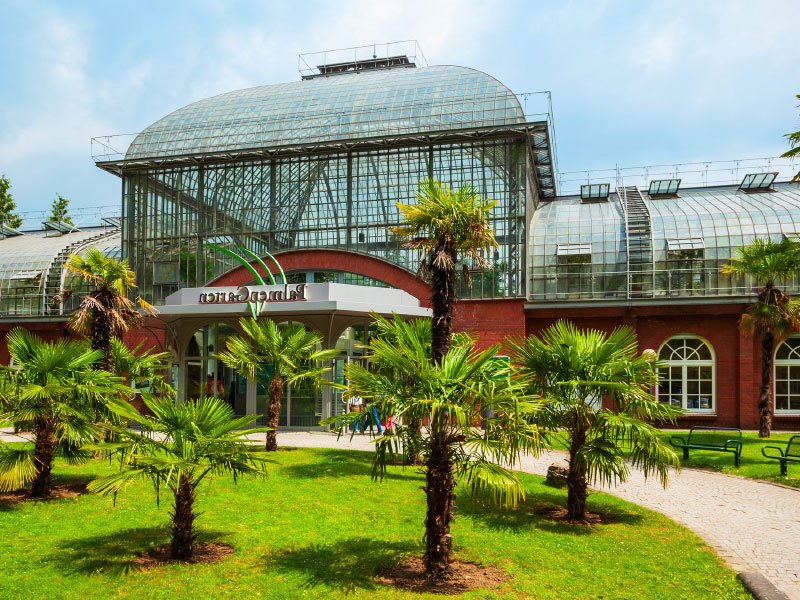
3. Palmengarten
Officially opened to the public in 1871, Frankfurt’s Palmengarten is a botanical garden divided into several sections, each with its own unique theme and plant collections. These expansive green spaces include tropical and subtropical greenhouses, a rose garden, and a Mediterranean terrace, each one designed to showcase different climate zones. It’s the perfect place for someone seeking a tranquil escape within the city.
In Conclusion
Frankfurt emerges not only as a bustling hub of business and commerce but as a dynamic and enriching destination that gracefully blends tradition with modernity.
Famed as a financial hub across Europe and the world, the city is brimming with opportunities for business travellers looking to further their professional careers. However, outside the boardrooms lies a vibrant cultural scene which can be easily overlooked amidst the thrum of commerce – the historic Römer or the renowned Städel Museum are just two examples of what you can find beyond the office walls.
In this guide, we have highlighted the nuances of local business etiquette – from the importance of punctuality to the practice of handing out business cards – and given our top travel and transport tips to ensure your trip goes smoothly from start to finish. Vielen Dank fürs Lesen und gute Reise!
Related Articles
Travel Talks – Wellbeing
Discover how to keep your corporate travellers happy and healthy while they’re away on business. In this Travel Talks episode, we explore exactly what Traveller Wellbeing actually is, why it’s so important to both employees and employers, and we present a host of easy to adopt strategies for healthier business trips.
What Does Good Customer Service Look Like?
What does good customer service look like? For Gray Dawes, travel management isn’t just about our award-winning technology or access to comprehensive travel content – even if these are vitally important to a travel programme. In this article, we spoke to our very own Julie Hamstead-Wallis, an experienced Operations Manager, about what makes good customer service, the importance of building rapport, and how Gray Dawes goes the extra mile to help our clients get the most out of their travel.
The Art of Business Networking Worldwide
Networking is more than just handing out business cards and hoping for the best. What works in New York might fall flat in Tokyo. A firm handshake may seal a deal in Germany, but in the Middle East, it’s the trust built over coffee and conversation that truly matters. In this guide to better international networking we help you build more meaningful and longer lasting connections—no matter where your business takes you.
CALL US
08448 553700
+44 (0) 1206 716111 (if outside the UK)
EMAIL US
ALWAYS HERE
Mon – Sun, 24 hours a day
LET’S TALK
Fill in the form below and we’ll get back to you as soon as we can.

